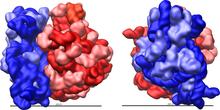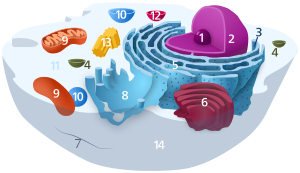
Back Ribosoom Afrikaans Ribosoma AN ريبوسوم Arabic Ribosom Azerbaijani Рыбасома Byelorussian Рибозома Bulgarian রাইবোজোম Bengali/Bangla Ribosom BS Ribosoma Catalan ڕایبۆسۆم CKB

| Cell biology | |
|---|---|
| Animal cell diagram | |
 Components of a typical animal cell:
|
Ribosomes (/ˈraɪbəzoʊm, -soʊm/) are macromolecular machines, found within all cells, that perform biological protein synthesis (messenger RNA translation). Ribosomes link amino acids together in the order specified by the codons of messenger RNA molecules to form polypeptide chains. Ribosomes consist of two major components: the small and large ribosomal subunits. Each subunit consists of one or more ribosomal RNA molecules and many ribosomal proteins (r-proteins).[1][2][3] The ribosomes and associated molecules are also known as the translational apparatus.
- ^ Konikkat S (February 2016). Dynamic Remodeling Events Drive the Removal of the ITS2 Spacer Sequence During Assembly of 60S Ribosomal Subunits in S. cerevisiae (Ph.D. thesis). Carnegie Mellon University. Archived from the original on 3 August 2017.
- ^ Weiler EW, Nover L (2008). Allgemeine und Molekulare Botanik (in German). Stuttgart: Georg Thieme Verlag. p. 532. ISBN 9783131527912.
- ^ de la Cruz J, Karbstein K, Woolford JL (2015). "Functions of ribosomal proteins in assembly of eukaryotic ribosomes in vivo". Annual Review of Biochemistry. 84: 93–129. doi:10.1146/annurev-biochem-060614-033917. PMC 4772166. PMID 25706898.